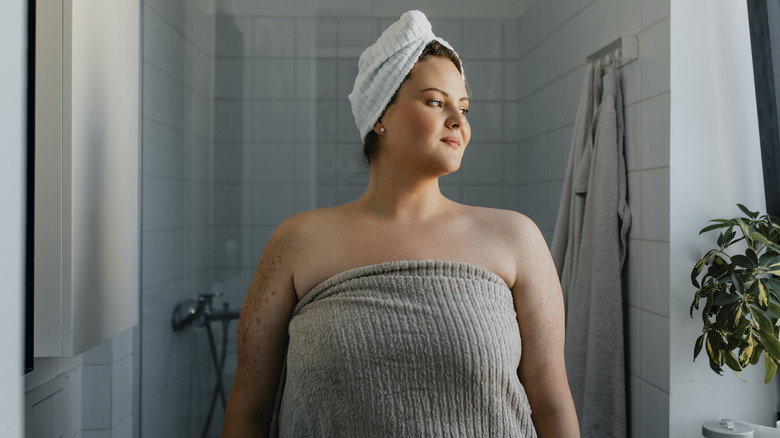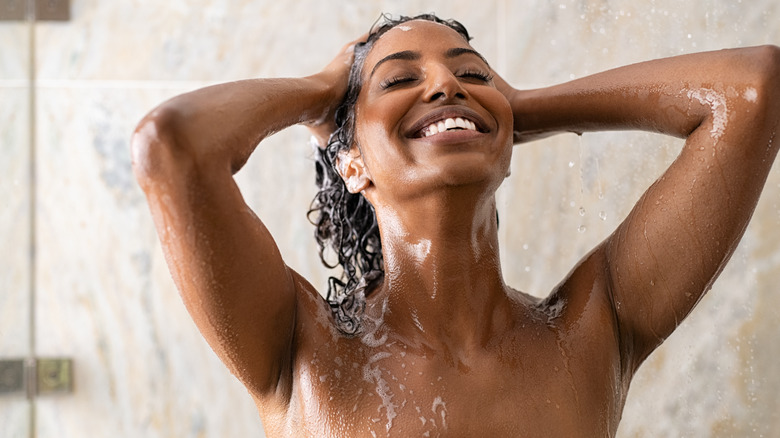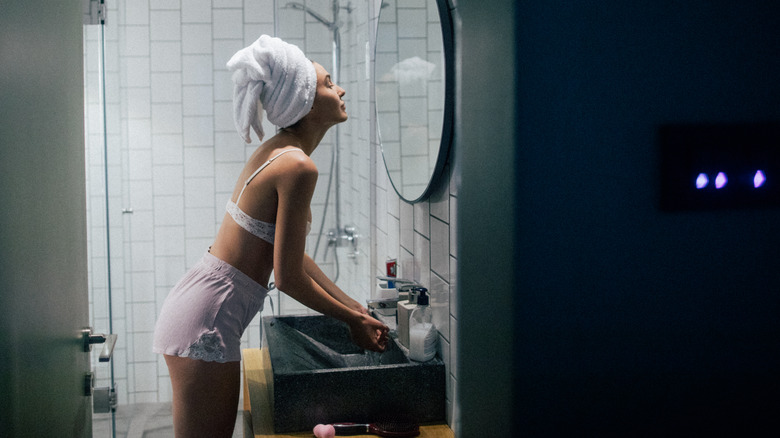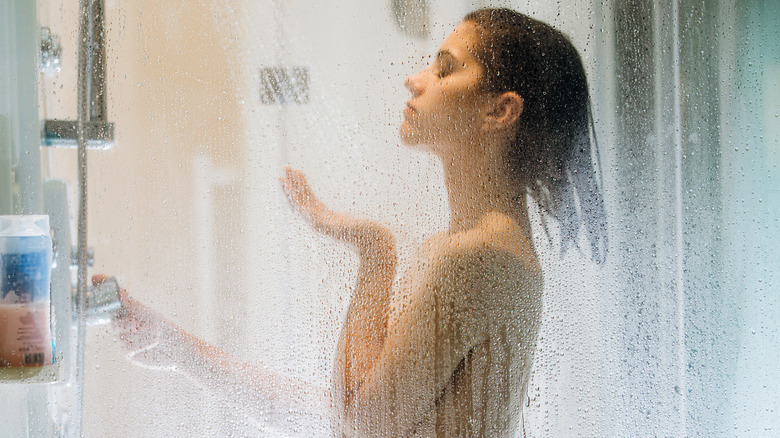Morning Or Night Shower? Inside The Mental & Physical Benefits Of Each
As humans, we love to choose sides: cats vs. dogs, vanilla vs. chocolate, and even the debate of morning showers vs. night showers. Most people are either in favor of morning showers or night showers, while others change it up depending on the day. There isn't a definitive right or wrong answer because it all comes down to your preference and lifestyle. Skincare experts tend to lean toward a nighttime share as the more hygienic option, while other experts will encourage a morning shower to increase alertness.
For the early birds, morning showers may help motivate you for the day ahead and get you moving. A nighttime shower, on the other hand, may help you wind down and relax after a long day without bringing outside dirt into the sheets. There are pros and cons to both shower options, so read on if you're curious about which one might work best in your routine.
Why take morning showers?
For a lot of people, a morning shower is refreshing and gets them ready for the day ahead. If you have trouble getting up and at 'em, rolling out of bed and stepping into the shower can give you the extra push you need. You might even feel more alert afterward, according to clinical psychologist Dr. Janet K, Kennedy via the New York Times.
A morning shower might be more helpful if you tend to sweat a lot at night while you sleep. As board-certified cosmetic dermatologist Dr. Dendy Engelman explained to Seventeen, "Bed sheets accumulate sweat, oil, bacteria, and dead skin cells, which we then lay in for hours at night, especially if the sheets aren't being cleaned regularly." Showering in the morning will wash all of this dirt away so you'll feel clean for the day.
This option might also make more sense for you if you like to spend time on your hair. You might prefer to wash your hair in the mornings, dry it, and style it for the day ahead, rather than washing it before bed or sleeping with wet hair. With morning showers, it's important to give yourself enough time in the morning when you have work or school, so you don't feel rushed or stressed while getting ready. Additionally, in the winter months, a morning shower might require you to have to be outside with wet hair if you don't have time to dry, which can be uncomfortable.
Why take night showers?
People who shower at night typically see it as the more hygienic option. As you go about your day, your body and hair collect dirt, sweat, chemicals, and even things like pollen or air pollution can affect your skin. Showering at the end of the day washes all of that grime away, so you aren't bringing it into your sheets and pillowcases, causing acne and skin irritation. You'll likely fall asleep more easily knowing you're fresh and clean. "Going to bed with clean skin and hair keeps your bed and bed linens cleaner, which not only feels good but also makes sense for hygiene since bed linens typically aren't washed more than once or twice a week," board-certified dermatologist Dr. Rebecca Marcus told Seventeen.
The hot water can soothe your muscles and prepare you for a good night's sleep. "The body naturally cools down as bedtime approaches, in sync with the circadian rhythm," psychologist Dr. Janet K. Kennedy told the New York Times. "Showering artificially raises the temperature again and allows for a faster cool down, which seems to hasten sleep." On a mental level, showering at night is a good way to relax and unwind after a long day. It's likely one of the last things on your to-do list that day, so you can take your time and simply enjoy feeling clean. But you don't want to spend too long in a hot shower, as this can irritate and dry out your skin.
Consider water temperature and shower duration, too
While people can debate all day long about which time of day is best to shower, it's important to also think about your shower temperature and how long you spend in there. It's recommended to shower for up to 15 minutes, according to experts at Healthline. While a hot shower is relaxing, staying in the hot water for too long can cause irritation and dryness, especially if you already have skin conditions like eczema or psoriasis. Bask in your hot showers, but be mindful of your skin as well. A warm shower may be better for sensitive skin, and surprisingly, cold showers have a lot of benefits, like improving acne and hair health.
Ultimately, showers are all about preferences and what works for you. Some days, it might even make sense for you to shower twice at different points of the day. This is okay, too. Maybe you showered in the morning but hit the gym after work, so it makes sense to shower again before bed to get all that sweat and gym germs off of you. If you work in a place with a lot of people, and a lot of germs, and you're on your feet all day, you might feel better having a shower before and after work. As long as both showers are relatively short and you moisturize afterward, you shouldn't have any issues.



